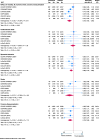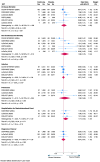Long-term trials of colchicine for secondary prevention of vascular events: a meta-analysis
- PMID: 40314333
- PMCID: PMC12233006
- DOI: 10.1093/eurheartj/ehaf174
Long-term trials of colchicine for secondary prevention of vascular events: a meta-analysis
Abstract
Background and aims: Colchicine has emerged as a safe and inexpensive anti-inflammatory medication to target the residual risk of cardiovascular events in the secondary prevention of coronary artery disease. Two recently published randomized controlled trials (RCTs) investigating colchicine in the post-stroke and post-myocardial infarction (MI) populations warrant a re-evaluation of colchicine. New evidence was synthesized in a systematic review and meta-analysis to determine the long-term efficacy and safety of colchicine for the secondary prevention of vascular disease.
Methods: Randomized controlled trials comparing the incidence of cardiovascular events between patients with clinically manifest vascular disease randomized to colchicine vs. placebo and ≥12-month follow-up were included. The primary efficacy endpoint is major adverse cardiovascular events (MACE) and includes cardiovascular mortality, MI, ischaemic stroke, and urgent coronary revascularization. The DerSimonian and Laird random effects model was used to calculate pooled effect estimates.
Results: Six RCTs, with a pooled sample size of 21 800 patients, were included (colchicine n = 10 871; placebo n = 10 929). Over a follow-up of 12-34 months, colchicine reduced the incidence of MACE compared with placebo [pooled hazard ratio .75, 95% confidence interval (CI) .56-.93]. The reduction in cardiovascular events among colchicine patients was driven by reductions in MIs, ischaemic strokes, and urgent coronary revascularizations (P < .05 for all). No differences were detected for safety outcomes (P > .05 for all), including non-cardiovascular deaths (risk ratio 1.08, 95% CI .76-1.54).
Conclusions: This updated meta-analysis of RCTs demonstrated a substantial reduction in MACE, MI, ischaemic stroke, and recurrent coronary revascularization with colchicine compared with placebo. Therefore, the results support the use of colchicine to reduce recurrent cardiovascular events.
Keywords: Atherosclerosis; Cardiovascular disease; Colchicine; Coronary artery disease; Inflammation; Myocardial infarction; Secondary prevention; Stroke.
© The Author(s) 2025. Published by Oxford University Press on behalf of the European Society of Cardiology.
Figures
References
-
- Ridker PM, Bhatt DL, Pradhan AD, Glynn RJ, MacFadyen JG, Nissen SE, et al. Inflammation and cholesterol as predictors of cardiovascular events among patients receiving statin therapy: a collaborative analysis of three randomised trials. Lancet 2023;401:1293–301. 10.1016/S0140-6736(23)00215-5 - DOI - PubMed
Publication types
MeSH terms
Substances
LinkOut - more resources
Full Text Sources






